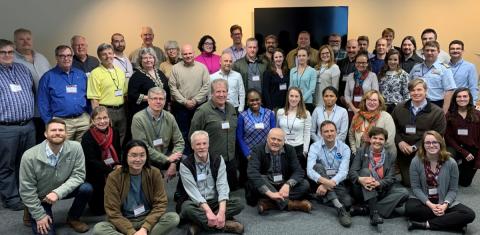Tuesday, January 14, 2020 to Wednesday, January 15, 2020
Seattle, WA
*Post-Workshop 4 Working Groups continued this effort. For more information on these Working Groups see the Working Group page
The workshop is made possible through NOAA's Office of Response & Restoration (OR&R) via funding from Canada Oceans Protection Plan’s Multi-Partner Oil Spill Research Initiative (MPRI) and hosted by the Coastal Response Research Center, University of New Hampshire.

Goal of workshop
NOAA ERD is in the process of developing software and collecting data for a new database of oil physico-chemical properties to support oil spill response decision-making. The primary goal of the database is to provide information that is useful for the response phase of a spill. We envision that the database would be used primarily for response, response planning, and environmental impact analysis. Secondarily, it could be useful for injury assessment, particularly in the initial phase. It could provide a basis for forensic analysis -- identifying “mystery spills”. Finally, the data could support oil spill research.
During this workshop, we hope to accomplish two main goals
- Identify the set of properties that should be included in a database record
- Work toward defining a recommended set of measurement protocols for the properties identified above (the Response Oil Assay)
- Discuss methods for measuring physico-chemical properties in a consistent way across labs
- Discuss methods for weathering oil in a controlled setting (e.g. lab or mesocosm)
The first goal will be the focus of Day 1. We will first focus on the questions that need to be answered as part of various aspects of oil spill response, assessment, and planning, and then compile a list of physico-chemical properties of fresh and weathered oils which help address the questions raised, and that can be measured before a spill occurs. As part of the discussion, we will start defining the minimum set of data required for multiple types of database records, which could be geared towards different use cases.
The second goal will be the focus of Day 2. We will discuss the analytical methods currently used by various labs to measure the physico-chemical properties of oil, and consider the merits of different methods for artificially weathering oil in a controlled setting such as a lab or mesocosm. We will also discuss methods for lab measurements of environmental behaviors of oils, such as evaporation and emulsification, and consider how these measurements in controlled settings can help us understand the behavior of oil in the field.
Agenda
Participants(revised post workshop)
Resources
- PRIORITY ADDITIONS TO THE ADIOS DATABASE, Laura M. Basirico, Louisiana State University, April 2020. (After analysis of the database, it was determined as suite of crude oil and refined products were necessary to contribute to the robustness of the database.)
- GAP ANALYSIS OF THE ADIOS OIL LIBRARY, Laura M. Basirico, Louisiana State University, January 2020.
- Ipieica/IOGP oil characterization guidance
- Oil Property Sheet (Chevron)
- Oil Property Summary Sheet (ECCC)
Presentations
- Welcome Background, Nancy Kinner
- Workshop Goals, Dalina Thrift-Viveros
- Emergency Response Key Questions, Doug Helton
- Response Modeling Key Questions, Chris Barker
- Preliminary Injury Assessment Key Questions, Sarah Allan
- Oil Spill Risk Assessment Key Questions, Matt Horn
- Oil Forensics Key Questions, Ed Overton
Panelists
- Dalina Thrift-Viveros, NOAA OR&R ERD
- Per Daling, SINTEF
- Julien Guypmarch, CEDRE
- Anusha Dissanayake, RPS Group
- Lyman Young, Consultant
- Sam Arey, ExxonMobil
- Victoria Broje, Shell
- ADIOS Database Gaps Analysis, Laura Basirico, LSU
- Summary of Lab Protocols Survey Results, Dalina Thrift-Viveros
Panelists
- Bruce Hollebone, Environment Climate Change Canada
- Lyman Young, Consultant
- Asphaltenes
- Interfacial Tension
- David Cooper, SL Ross Environmental Research Ltd
- Julien Guyomarch, CEDRE
- Per Daling, SINTEF
- Heather Dettman, Natural Resources Canada
- Tim Nedwed, ExxonMobil
- The Proxy Problem, Steve Jones, NOEE OR&R ERD
Workshop Planning Committee
- Nancy Kinner, CRRC
- Sarah Allan, NOAA OR&R ARD
- Chris Barker, NOAA OR&R ERD
- Amanda Bess, Chevron
- Carl Childs, NOAA OR&R ERD
- Lisa DiPinto, NOA OR&R
- Gregory Hall, U.S. Coast Guard Academy
- Doug Helton, NOAA OR&R ERD
- Bruce Hollebone, Canada
- Robert Jones, NOAA OR&R ERD
- Dalina Viveros, NOAA OR&R ERD
Venue
NOAA Western Regional Facility (Building 3 - Oceanographer Room)
7600 Sand Point Way
Seattle, WA
A Foreign National Form must be submitted as soon as possible.
In order to access the NOAA campus please bring your photo ID. Your name must be on our master sheet of attendees in order to enter the security gate as well as Building 3.
There is plenty of free parking.
Lodging
Silver Cloud Hotel - Seattle University District ($184/federal rate) Group Name: Response Oil Assay
5036 25th Ave NE
Seattle, WA 98105
(206) 526-5200 or (800) 205-6940
Complimentary breakfast, wifi and shuttle to our meeting venue. Onsite parking is available for $15/day.
Make your own Response Oil Assay lodging reservation.
Questions? Please contact Kathy Mandsager.